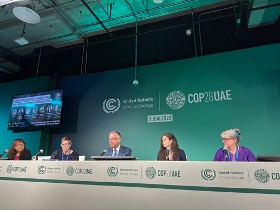Transformative Narratives at COP28: Food System Revolution Unveiled
During COP28, Religions for Peace, the Baha’i International Community, Tzu Chi Foundation, Compassion in World Farming, ProNobis Agroflorestal, and the Good Food Fund organised an enlightening side event entitled “Food System Transformation: Elevating Healthy Diets and Protein Diversification as Climate Solutions.” The event featured perspectives, ideologies, and solutions that transcended the boundaries of disciplines.
Chief Rabbi David Rosen, Co-President of Religions for Peace, ignited the conversation by invoking the divine, asserting that environmental degradation is a betrayal of religious values. Rabbi Rosen’s plea for a sustainable future resonated deeply as he connected ancient wisdom with modern challenges, urging a shift from a “culture of waste” to a lifestyle rooted in modesty and responsibility.
Dr. Lina Mahy, Technical Officer, Department of Nutrition and Food Safety in Geneva, World Health Organisation (WHO) echoed Rabbi Rosen’s sentiments, emphasising the interconnectedness of health, diet, and climate change. Dr. Mahy outlined the WHO’s commitment to Food Systems Transformation, underscoring the importance of healthy diets, protein diversification, and climate action. Her four key points, ranging from promoting sustainable diets to linking nutrition with climate action, painted a comprehensive picture of the WHO’s proactive stance.
Ms. Gabriella Rawhani, representing the Baha’i International Communities at the United Nations Office in Geneva, delved into the values shaping our relationship with food systems. She eloquently expressed how a values-based grassroots approach could bridge the knowledge-action gap. Ms. Rawhani’s emphasis on empathy, justice, and oneness resonated deeply with attendees as she shared the transformative work of NGOs, such as the Foundation for the Application and Teaching of Science.
Dr. Ming Nan Lin from the Tzu Chi Foundation brought a health expert’s perspective, advocating for a plant-based diet to prevent future pandemics and improve personal health. His presentation, supported by research on reduced mortality rates and lower diabetes risks, underscored the health benefits of plant-based diets.
Ms. Deborah Tripley, Global Director Campaigns and Advocacy, a Global Director Campaigns and Advocacy at Compassion in World Farming, sounded an urgent call for action, highlighting the environmental impact of the current food system. Dr. Tripley’s call for restructuring public and economic systems aligned with her emphasis on the interconnectedness of human health, environmental sustainability, and animal welfare.
Ms. Karina David from ProNobis Agroflorestal challenged conventional notions about food production by highlighting the symbiotic relationship between forests and food. Her agroforestry success story showcased the viability of sustainable and circular production systems.
Melinda Hou, Executive Director of the Good Food Fund in Beijing shed light on the challenges and opportunities in promoting sustainable food systems in China. Despite economic growth, Ms. Hou acknowledged the need for awareness about the impact of food choices, and the Good Food Fund’s initiatives aimed to address this gap.
The Q&A session added depth to the discussion with questions ranging from addressing perverse subsidies, to the adoption of taxonomy guidelines. The panellists provided insights into policy changes, education, and the role of religion in promoting values for healthier diets.
The session concluded with a resounding call to action, emphasising the need for collective efforts, research, policy changes, and engagement to transform food systems. This side event not only unveiled transformative narratives, but also set the stage for a holistic approach to addressing the complex challenges at the intersection of food, health, and climate change.